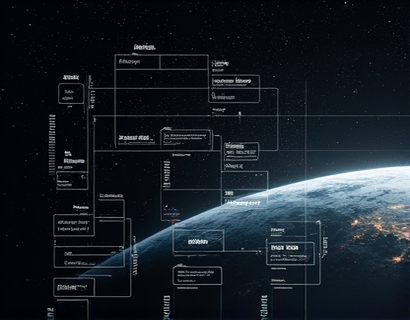Decentralized DAO Management: Maximizing Efficiency and Transparency with Advanced Analytics Software
In the rapidly evolving landscape of decentralized finance and governance, Decentralized Autonomous Organizations (DAOs) have emerged as a revolutionary model for managing collective decision-making and resource allocation. However, the effectiveness of a DAO largely depends on its governance structure and the tools employed to facilitate management. Advanced analytics software plays a crucial role in transforming DAO governance, driving sustainable growth, and enhancing collaboration among members. This article explores how DAO managers and administrators can leverage advanced analytics software to maximize efficiency and transparency, ultimately leading to informed decision-making and improved governance.
The Importance of Effective DAO Management
DAOs operate on the principles of decentralization, transparency, and community-driven governance. However, managing a DAO is not without its challenges. The absence of a centralized authority can lead to inefficiencies, miscommunication, and a lack of accountability. Therefore, effective management is essential for ensuring that a DAO functions smoothly and achieves its objectives.
Effective DAO management involves several key components, including clear governance structures, transparent decision-making processes, and efficient resource allocation. By implementing advanced analytics software, DAO managers can streamline these components, enabling better collaboration and more informed decision-making.
Streamlining Governance with Advanced Analytics
Governance is the backbone of any DAO. It defines how decisions are made, how resources are allocated, and how members interact with one another. Advanced analytics software can significantly enhance governance by providing insights into member participation, voting patterns, and proposal outcomes.
Understanding Member Engagement
One of the primary challenges in DAO governance is ensuring active participation from all members. Advanced analytics tools can track member engagement metrics, such as proposal voting rates, attendance at meetings, and participation in discussions. By analyzing this data, DAO managers can identify trends and patterns that may indicate disengagement or areas where members may need additional support.
Analyzing Voting Patterns
Voting is a critical aspect of DAO governance, as it determines the direction of the organization. Advanced analytics software can analyze voting patterns to identify which proposals receive the most support and which members are most active in the voting process. This information can help DAO managers understand the preferences of their community and tailor future proposals to align with member interests.
Evaluating Proposal Outcomes
After a proposal is voted on, it is essential to evaluate its outcomes to determine its effectiveness. Advanced analytics software can track the performance of implemented proposals, measuring their impact on the DAO's objectives. By analyzing this data, DAO managers can make data-driven decisions about future proposals and governance strategies.
Enhancing Collaboration Among Members
Collaboration is vital for the success of any DAO. Members must work together to achieve common goals, share knowledge, and support one another. Advanced analytics software can facilitate collaboration by providing tools for communication, project management, and knowledge sharing.
Communication Tools
Effective communication is essential for collaboration. Advanced analytics software can integrate communication tools that allow members to discuss proposals, share ideas, and provide feedback in real-time. By fostering open communication, DAO managers can create a more inclusive environment where all members feel valued and heard.
Project Management Features
Managing projects within a DAO can be complex, especially when multiple members are involved. Advanced analytics software can offer project management features that help members track progress, assign tasks, and set deadlines. By streamlining project management, DAO managers can ensure that initiatives are completed efficiently and effectively.
Knowledge Sharing Platforms
Knowledge sharing is crucial for fostering innovation and continuous improvement within a DAO. Advanced analytics software can provide platforms for members to share resources, best practices, and lessons learned. By creating a culture of knowledge sharing, DAO managers can empower members to contribute their expertise and drive the organization forward.
Driving Sustainable Growth with Data-Driven Decision Making
Data-driven decision-making is essential for the long-term success of any DAO. Advanced analytics software enables DAO managers to make informed decisions based on real-time data and insights. This approach not only enhances governance but also drives sustainable growth.
Identifying Growth Opportunities
Advanced analytics software can help DAO managers identify growth opportunities by analyzing market trends, member preferences, and competitive landscapes. By leveraging this data, DAO managers can develop strategies that align with the needs of their community and capitalize on emerging trends.
Measuring Performance Metrics
To drive sustainable growth, DAO managers must measure key performance metrics regularly. Advanced analytics software can track metrics such as member retention rates, proposal success rates, and overall community engagement. By monitoring these metrics, DAO managers can assess the effectiveness of their governance strategies and make necessary adjustments.
Adapting to Change
The decentralized ecosystem is constantly evolving, and DAOs must be able to adapt to change. Advanced analytics software provides DAO managers with the tools to analyze external factors that may impact their organization, such as regulatory changes, market shifts, and technological advancements. By staying informed and adaptable, DAO managers can ensure the long-term sustainability of their DAOs.
Enhancing Transparency in DAO Governance
Transparency is a core principle of DAOs, and it is essential for building trust among members. Advanced analytics software can enhance transparency by providing clear insights into governance processes, decision-making, and resource allocation.
Transparent Decision-Making Processes
Advanced analytics software can document decision-making processes, making it easy for members to understand how and why decisions are made. By providing access to this information, DAO managers can foster a culture of transparency and accountability.
Resource Allocation Insights
Understanding how resources are allocated is crucial for maintaining transparency within a DAO. Advanced analytics software can provide insights into budget allocations, funding distributions, and project expenditures. By making this information accessible to all members, DAO managers can ensure that resources are used effectively and responsibly.
Real-Time Reporting
Real-time reporting features in advanced analytics software allow DAO managers to share updates and insights with members promptly. This transparency fosters trust and encourages members to stay engaged in the governance process.
Challenges in Implementing Advanced Analytics Software
While the benefits of advanced analytics software for DAO management are clear, there are also challenges to consider. DAO managers must be aware of these challenges and develop strategies to overcome them.
Data Privacy and Security
Data privacy and security are paramount when implementing advanced analytics software. DAO managers must ensure that member data is protected and that analytics tools comply with relevant regulations. Implementing robust security measures and transparent data handling practices can help address these concerns.
Member Adoption and Training
For advanced analytics software to be effective, members must be willing to adopt and utilize the tools provided. DAO managers should invest in training and support to help members understand how to use the software effectively. By fostering a culture of learning, DAO managers can encourage member engagement and participation.
Integration with Existing Systems
Integrating advanced analytics software with existing systems can be a complex process. DAO managers should carefully evaluate their current tools and workflows to ensure a smooth transition. Collaborating with software providers to customize solutions can help address integration challenges.
Conclusion
Decentralized Autonomous Organizations represent a new frontier in governance and collaboration. By leveraging advanced analytics software, DAO managers can maximize efficiency and transparency, driving sustainable growth and informed decision-making. The ability to streamline governance, enhance collaboration, and gain valuable insights is essential for the success of any DAO. As the decentralized ecosystem continues to evolve, embracing advanced analytics will empower DAOs to unlock their full potential and thrive in an increasingly competitive landscape.










































